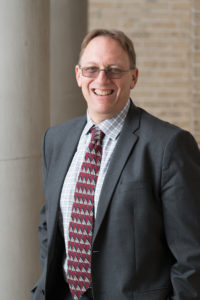
It’s been a historic year for CSU discovery and innovation, with research expenditures reaching nearly $400 million in Fiscal Year 2019.
Behind the record-setting research numbers of the last two years are numerous stories of people, passionate in their pursuit of knowledge and the impact it can bring, who understand the power of communicating that across Colorado and around the globe. The translation of our ideas into practice continues to make significant contributions to our ever-increasing desire to understand and make impacts in the lives of the people of the world.
Our research and innovation enterprise is driven by the enormous opportunities and challenges we face as well as the land-grant ethos at Colorado State. We thrive because we engage in important dialogues and collaborate across disciplines and languages, creating networks of innovation, on campus and beyond. Our enterprise includes undergraduate and post-graduate students, faculty, staff and research leadership in the university. Their work contributes to a rich fabric of ideas and their application through discovery and innovation. At the heart of many of these important applications are discoveries in basic research that CSU makes every day.
Making impacts on climate change
This year, CSU made important contributions to the science around climate change and its broad implications for ecosystems. Our Cooperative Institute for Research in the Atmosphere, a cooperative institute with NOAA in the Walter Scott, Jr. College of Engineering, is one of the premier institutions in the country using satellites to track and analyze weather patterns with unparalleled precision. The predictions and images of the devastating Hurricane Dorian this summer are just one example of the impact this institute makes every day.
Air quality and its implications for human and animal health is another area where we are making important contributions, from the feedlots of Colorado to the rainforest regions of Africa. The Partnership for Air Quality Climate and Health (PACH) has created a collaborative internal network that brings together CSU experts from a range of disciplines to conduct and communicate research and results to a variety of external stakeholders as well as the academic communities.
We also implemented a new Integrative Graduate Education and Research Traineeship with the National Science Foundation for graduate training in food-energy-water research areas, many now driven by climate change. The Energy Institute with faculty from across campus hosted a large ARPA-e conference that highlighted the impacts we are making in understanding and measuring methane leaks into the atmosphere from a variety of oil and gas platforms.
Accelerating innovations in health care, biosecurity
CSU is also experiencing tremendous growth in medical research that can benefit both animals and humans. The university opened a new state-of-the-art Translational Medicine Institute that will accelerate innovations in animal regenerative and musculoskeletal medicine and care across species.
The Infectious Disease Research Center amplified its impact through historic partnerships this year. Zoetis, the largest global animal health care company, has signed a long-term agreement to work on livestock health with our students, faculty and core facilities on our Foothills Campus in the Research and Innovation Center.
At the same time, CSU has led a consortium of six land-grant universities working in the critical area of agricultural biosecurity to protect Colorado and the nation from diseases that could cripple our local and national economy, as we experience one of the largest livestock outbreaks in history.
Our BioMARC manufacturing facility on the Foothills Campus established partnerships this year to produce new medicines for human clinical studies in global diseases such as influenza and tuberculosis. It was also awarded its first grant to support a human clinical trial for its vaccine against Rift Valley Fever, a disease that devastates communities in Africa. BioMARC was also named the 2019 Colorado Manufacturer of the Year.
Our attention to facilitating campus discoveries in this area will also include new planned additions in clinical affairs compliance and regulatory measures needed to extend our impact in human medical practice. The launching of the Columbine Health Systems Center for Healthy Aging will also benefit from these additions.
Raising CSU’s reputation through faculty recognition
Our outstanding faculty, staff and student researchers were recognized this year for their contributions. Of particular note, Dr. Sue VandeWoude from the College of Veterinary Medicine and Biomedical Sciences was elected this year to the National Academy of Sciences for her world-renowned work in wildlife management with a focus on disease management in big cats. She is only the second woman at CSU to achieve this honor, joining internationally acclaimed ecologist Diana Wall. The election of Wall and VandeWoude brought the number of Academy members who are part of the CSU faculty to six.
Dr. VandeWoude also typifies the excellence in scholarship of our discoverers across CSU, passionate about her outstanding work, collaborative across campus as well as inside and outside the U.S., an outstanding teacher, active in CSU and community service, and a mentor to students and valued colleagues.
The communication of science to society continues to be a focus of our work. This year we hosted important discussions on research topics from agricultural innovation to water in the West. From the dialogue on vaccination to freedom of speech, research and scholarship have an important role to play in helping frame questions and issues while convening diverse perspectives. We will continue this work and expand our dialogue next year to include scholarship and its role in a democratic society.
It may have been a historic year for CSU numbers, but every day the university makes history with outstanding people who are passionate about discovery and translating that knowledge to make impacts in the communities we serve.
Alan Rudolph is the Vice President for Research at Colorado State University.